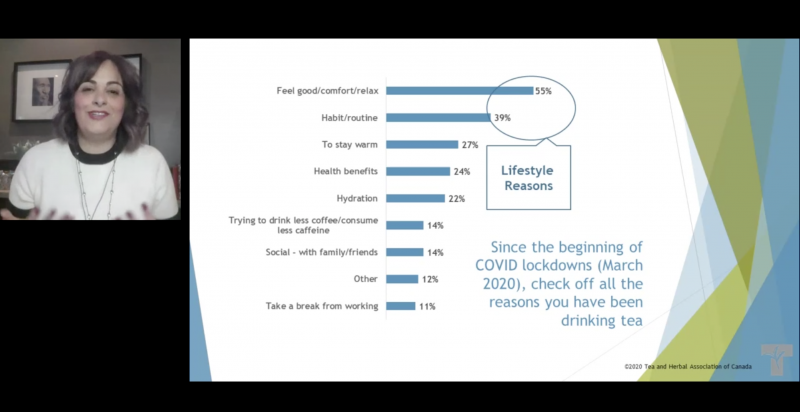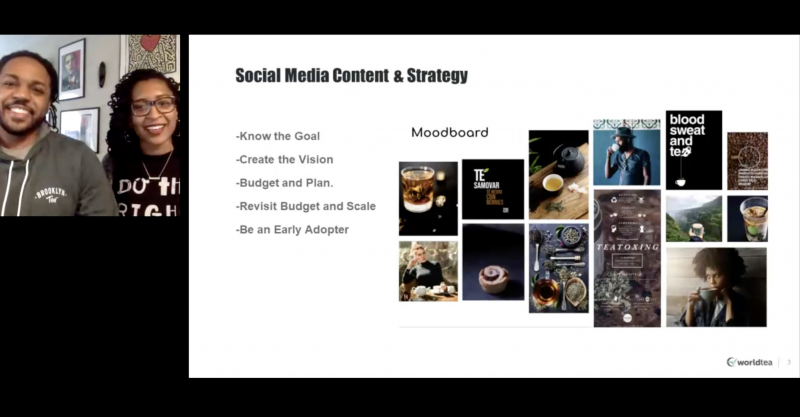The tea industry faced unprecedented challenges throughout 2020 due to COVID-19, and it quickly pivoted and adapted to a virtual existence. Questex's World Tea Virtual Summit: Strategies for Success, which took place March 15-16, 2021, and is now available to watch on-demand, sought to address the obstacles from COVID-19 and inspire even more creative problem solving for moving forward.
The State of the Industry
Shabnam Weber, president of the Tea & Herbal Association of Canada, asked virtual attendees to consider a question during her session: Is this the year to be forgotten or the year not to be forgotten?
Weber pointed out that the tea industry came to an abrupt stop at the beginning of the pandemic, and companies were immediately challenged to pivot and adapt. If a tea business was not already online, the decision to go online was made quickly (in fact, decisions were made twice as quickly at the beginning of the pandemic). If an online presence already existed, it was reinforced.
According to Weber, the tea industry had a great year despite challenges. In 2020, consumers fed into their emotional connection to tea, and in-home tea sales saw an increase of 18 percent. The two principal reasons for purchase increases were lifestyle-related, including “feel good/comfort/relax” and “habit/routine.”

At the conclusion of her session, Weber's answer to the question addressed in the beginning was simple: “If you believe it's the year to be forgotten, you have not been paying attention. You have got to be innovating your business,” she said, “even if you happen to be in an area that is now coming out of COVID, that has access to vaccines that is seeing the opening-up of businesses. Because a lot of the habits and lifestyle choices we as consumers have made in the past 12 months are not going to go away."
Let's Rethink How We Train New Employees
Babette Donaldson, founder of Tea Sippers Society and publisher/owner of T Ching, encouraged attendees to embrace the beginner's mind. Donaldson stressed that new employees are an asset, so to take the time to find out what they bring to the table.
Donaldson suggested that tea businesses should consider common questions that customers have when training employees and teaching them skills (tea brewing, etc.), to allow them to have a sensory experience they can share with customers. A customer-focused training and educational approach will build confidence in new employees. When employees can meet the customer at their level of knowledge, this creates an authentic relationship.
Donaldson said she believes in the power of the tea story: "Sometimes our newbies don't realize until they're encouraged to think back over their own life experience that they already have a tea story, and it helps them come to that identity that they are already a tea person. But it's important for every employer to share their story, what inspired them to start the business, what keeps them going day after day."
Tea Publicity in 2021: 6 Journalists & Bloggers, 5 Key Questions, and Tons of Insight
Aaron Kiel, editor of World Tea News, curated an expert panel of leading writers, bloggers, editors and publishers, who offered critical tips and dos and don'ts when pitching a story or beginning a relationship with the media.
The panel featured: Lorna Reeves, editor of TeaTime Magazine; Vanessa Facenda, editor of Tea & Coffee Trade Journal; Martin Boháčik, founder/editor of Eighty Degrees Magazine; Babette Donaldson, owner/publisher of T Ching; Gail Gastelu, owner/publisher of The Tea House Times, and Nicole Wilson, tea writer/blogger, Tea For Me Please.
Key takeaways from the panel, for working with tea media, included:
- Know the publication or media outlet before you pitch them or begin working with them.
- Understand the media outlet’s mission – what they cover and do not cover, the types of stories they prefer to feature.
- Have a clear vision of your pitch or media relationship expectations.
- And be aware of current trends to help deliver a strong story suggestion.
Social Media Geared for the Tea Industry
Jamila McGill and Alfonso Wright, co-owners of Brooklyn Tea Company, discussed the importance of social media, digital content and strategy. McGill and Wright explained the importance of utilizing Facebook, Instagram, TikTok, Snapchat and other platforms for content, engagement and digital ads. "[Social media platforms] give you a way to inexpensively reach your audience on your terms,” said Wright. “You can talk person to person, to groups, and let the feedback talk to you, which was never possible until the social media revolution.”
Both co-owners acknowledged that social media is a fluid process, but it is necessary to have a goal, vision, budget, and to be an early adopter. They wrapped up by concluding their four main points: 1) Consider your target market when creating digital ads. 2) Start with the data you have. 3) Utilize free information. 4) Monitor social media data daily.

Overall, the digital summit addressed key issues to support tea businesses, and all the valuable speaker insights can be accessed on-demand by visiting WorldTeaExpo.com/ondemand2021.
Sponsors of the event included: KureTea, Hands of Sage, Erika’s Tea Room, Menna and Araska Tea Garden.
Next Up: World Tea Conference + Expo 2021
After you listen to the World Tea Virtual Summit on-demand, plan to attend or exhibit at Questex’s World Tea Conference + Expo, July 14-16, 2021 in Denver, Colo. Conference delegates will experience new tea products, discover new ways to profit from tea across vertical markets, gain insights on starting or running a tea business, hear about the latest tea trends, and discuss tea issues in the global marketplace.
To inquire about the World Tea Conference + Expo or to become a 2021 sponsor, contact the World Tea team at [email protected] or visit WorldTeaExpo.com. And be sure to follow the upcoming event on Twitter (@worldteamedia) and Facebook and Instagram (@worldteaexpo), or via #WorldTea2021.
